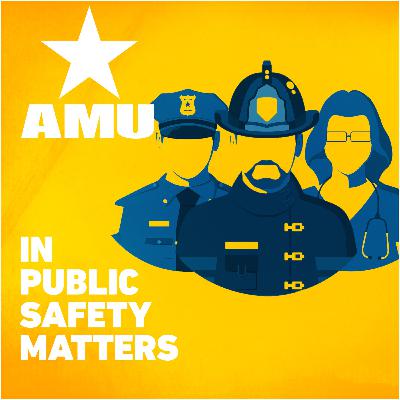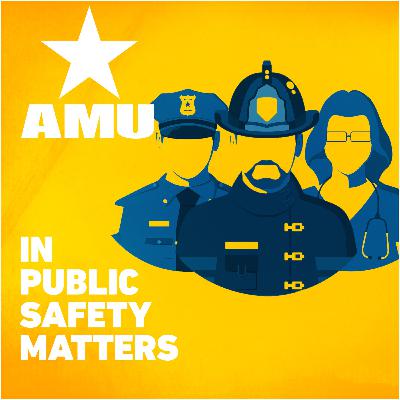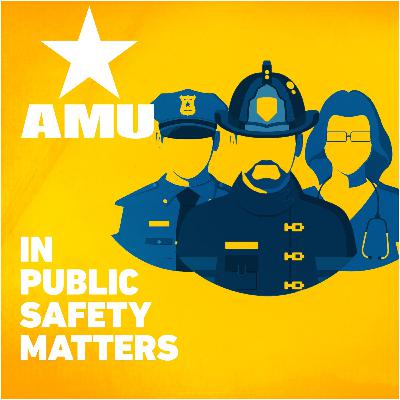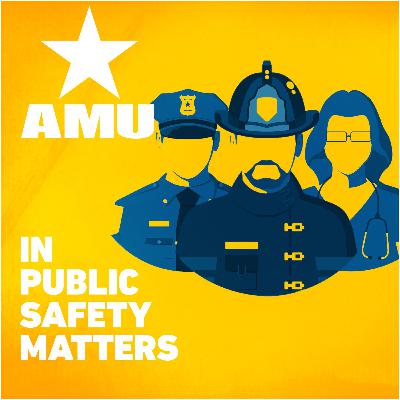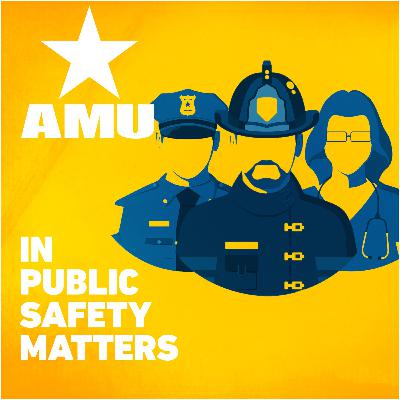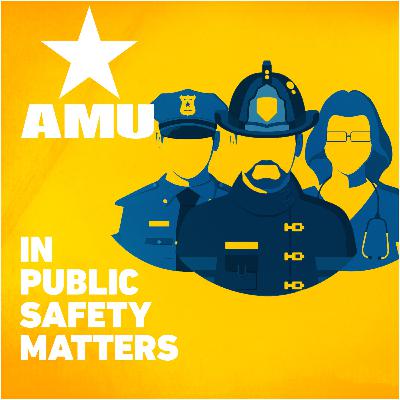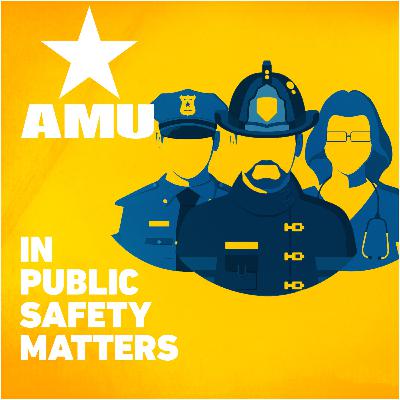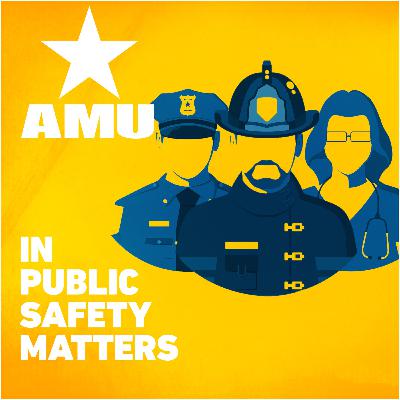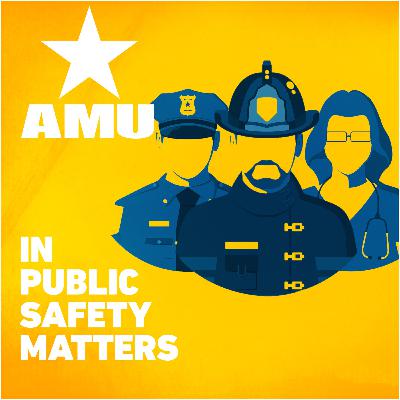Discover AMU In Public Safety Matters
AMU In Public Safety Matters

AMU In Public Safety Matters
Author: American Military University
Subscribed: 7Played: 282Subscribe
Share
© American Military University
Description
Public safety professionals face ongoing challenges and struggles. American Military University brings you In Public Safety Matters, a podcast featuring experts in law enforcement, corrections, the fire service, and municipal leadership discussing some of the most relevant and challenging issues in public safety today. To learn more, visit AMUonline.com.
Hosted on Acast. See acast.com/privacy for more information.
60 Episodes
Reverse
The cybersecurity field is finding it difficult to build the workforce it needs to protect businesses and individuals. In this episode, AMU’s Dr. Nicole Drumhiller explores the intriguing aspects of cybersecurity with Andre Slonopas. Hosted on Acast. See acast.com/privacy for more information.
In this episode, Dr. Christopher Reynolds, AMU’s Dean and Vice President of Academic Outreach and Program Development, offers some expert advice on what to do before, during and after a hurricane. Hear what he’s learned during his more than three decades of emergency management and disaster preparedness experience. Hosted on Acast. See acast.com/privacy for more information.
On this episode of In Public Safety Matters, AMU’s Dr. Larry D. Parker, Jr. talks to retired police Sergeant John Downey about the current perception of policing in America and his 12-year career with the NYPD. John also offers solid advice for young people thinking of going into the field of law enforcement and shares his experiences since transitioning from cop to civilian. There’s even a mention of boxing champion Mike Tyson. Hosted on Acast. See acast.com/privacy for more information.
In this episode of In Public Safety Matters, AMU’s Senior Manager of Public Sector Outreach, Buster Nicholson, speaks to Corpus Christi Councilman Roland Barrera about Bitcoin mining and other energy matters affecting his city and the state of Texas. Hosted on Acast. See acast.com/privacy for more information.
Hear from graduates and faculty members as they celebrate the classes of 2020, 2021, 2022! Hosted on Acast. See acast.com/privacy for more information.
Corrections officers die by suicide at a rate of three to four times that of the general public. In this episode, AMU Criminal Justice professor Dr. Michael Pittaro talks about the mental health crisis in corrections. Learn about his upcoming testimony in Washington, D.C. advocating for awareness and change to help correctional officers. Hosted on Acast. See acast.com/privacy for more information.
Inflation rates are skyrocketing. In this episode, AMU’s Buster Nicholson talks to Mayor Scott Conger of Jackson, Tennessee about his initiative to invest in and education his constituents about investing in Bitcoin and cryptocurrency to hedge inflation. Learn about the potential of digital funds, the city’s efforts to educate people about cryptocurrency, and how its adoption could benefit municipalities and lead to the evolution of our monetary system. Hosted on Acast. See acast.com/privacy for more information.
Recidivism rates across the country are extremely high. In this episode, AMU’s Dr. Jarrod Sadulski talks to Jon Ponder, the CEO of Hope for Prisoners, a faith-based, non-profit organization that focuses on reducing recidivism by helping to rehabilitate offenders and prepare them for reentry. Learn about its intensive training program with inmates while they’re still incarcerated and its case management and mentoring programs that assist for 18 months after their release. Also learn how they partner with law enforcement agencies to work with inmates as well as companies to hire formerly incarcerated people. Hosted on Acast. See acast.com/privacy for more information.
In 2020, there were 365,000+ reports of missing children across the United States. Law enforcement agencies often do not have the resources, manpower or intelligence-based skillsets to bring these children back to their families. In this episode, AMU professor Dr. Jarrod Sadulski talks to Richard Ring, CEO of F3 Missing Children's Intelligence Agency, about bringing together intelligence analysts, retired special operations and military personnel, and retired federal law enforcement officers to help investigate missing children cases. Learn about the importance of using an intelligence-based approach to finding missing children and the challenges associated with investigating cold cases. Hosted on Acast. See acast.com/privacy for more information.
Are you interested in working in law enforcement or the criminal justice field? In this episode, Dr. Jarrod Sadulski talks to AMU Criminal Justice professor Dr. Michael Pittaro about his new book, “Pursuing and Navigating a Career in Criminal Justice,” based on his 30+ years of experience working in the criminal justice system. Learn how to get into the field, including tips on preparing for the interview process, the background check, as well as the physical and psychological exams. Once hired, learn what to expect in the Academy, during the probational period, and how to set yourself up for future promotions. Also learn how to navigate the many challenges that law enforcement brings including stress, burnout, low morale, and mental health issues as well as some of the critical coping mechanisms to manage the stress and difficulties of the profession. Hosted on Acast. See acast.com/privacy for more information.
There are more than 250,000 unsolved murders in the United States and law enforcement simply does not have the personnel or resources to investigate all of them. As a result, average citizens, private investigators, and the media have come together to help reinvestigate many of these cold cases. In this episode, Glynn Cosker talks to AMU criminal justice and forensic science professor, Jen Bucholtz, about her work as a private investigator to investigate several cold cases. Learn how she has used the power of crowdsourcing and social media to engage people and uncover new information, and how advancements in DNA technology and forensic genealogy are helping police solve more cases. Also hear why it’s so important for law enforcement agencies to embrace the assistance of outside sources to help bring justice for the families of these victims. Hosted on Acast. See acast.com/privacy for more information.
After seven plus years of hard work, a former news reporter, Dale Julin, has cracked some of the Zodiac Killer’s numerous ciphers and anagrams. In this episode, AMU criminal justice and forensic science professor, Jen Bucholtz, who also has a background in counterterrorism and private investigations, shares how the ciphers were decrypted using the suspect’s full name. She also discusses the mounting evidence pointing towards Gary Francis Poste including matching physical scars that had been identified by multiple witnesses, military training on a specific type of cipher and decrypting methodology used in the Zodiac letters, geographical location during the times of the murder, and more. Learn why she has partnered with The Case Breakers, an investigation group of more than 40 former law enforcement and experts, to bring this evidence to police in hopes they’ll take this information seriously and find resolution to one of the country’s most notorious unsolved serial killing cases. Hosted on Acast. See acast.com/privacy for more information.
Leaving the military and transitioning to the civilian workforce isn’t easy and requires hard work and preparation. In this episode, AMU professor Dr. Jarrod Sadulski talks to William Balcerski, who successfully started a new civilian career after 30 years of active duty and reserve experience in the U.S. Coast Guard. Learn why servicemembers need two years to prepare for this transition to develop their professional network, earn a degree before separating, and conduct research on companies and its leaders. Also learn practical advice like how to identify transferable skills, tailor your resume for each position, and develop a post-military budget so you’re financially prepared when your service ends. Hosted on Acast. See acast.com/privacy for more information.
Being a municipal leader means working with a diverse group of people. In this episode, AMU’s Buster Nicholson talks to Horace McHugh, President of Florida City County Management Association about his experience in municipal leadership and the strategies that have worked best to help him accomplish community goals. Learn the importance of training and professional development, the role of ethics and integrity in government leadership, and why all municipalities should encourage mentoring among employees. Hosted on Acast. See acast.com/privacy for more information.
In August 2021, a 7.2 magnitude earthquake hit Haiti causing massive and widespread destruction. Shortly after the earthquake struck, a tropical depression swept through the country causing further devastation and impeding rescue and recovery efforts. In this episode, Glynn Cosker talks to AMU’s Dr. Chris Reynolds about his experience responding directly to the 2010 earthquake and his perspective on the challenges Haiti faces. Learn how limited infrastructure, rampant governmental corruption including a recent coup and the assassination of Haiti’s president, along with criminal violence have all contributed to Haiti’s inability to prepare or respond to disasters and its reliance on foreign aid. Hosted on Acast. See acast.com/privacy for more information.
Across the country, law enforcement agencies are seeing an exodus of officers leaving the profession. Agencies are also receiving fewer, high-quality candidates applying to fill those positions. In this episode, Dr. Gary Deel talks to AMU Criminal Justice program director Dr. Chuck Russo about the current state of law enforcement. Learn how agencies need to do a better job accurately representing the work of police officers to attract new and diverse recruits who have the right skillsets for the profession. Also hear discussion about topics like qualified immunity, body camera policies, training improvements, and more. Hosted on Acast. See acast.com/privacy for more information.
The 2020 hurricane season was a recording-breaking year with 30 named storms, but because none of them brought significant devastation, most people were unaware of the number of storms. In this episode, Glynn Cosker talks to AMU’s Dr. Christopher Reynolds about the importance of preparing for hurricane season by packing an emergency disaster kit and hardening your house and property. Also learn why it’s dangerous and frustrating for emergency management personnel when people don’t evacuate when told to so. Hosted on Acast. See acast.com/privacy for more information.
While there’s an increasing emphasis on evidence-based policing, much of that research remains inaccessible to officers on the street. In this episode, AMU’s Leischen Kranick talks to Susanne Knabe-Nicol about her efforts to make scientific research practical and useful for law enforcement officers around the world. Learn how she’s converting important research on investigative interviewing, offender profiling, crime analysis and more into videos and online courses to help officers better understand and apply this information. Also learn about her work to improve officer mental health and resiliency through training and educating agency leaders. Hosted on Acast. See acast.com/privacy for more information.
After 16 years as an unsolved cold case, an arrest was finally made in the murder of Rebekah Gould. In this episode, AMU criminal justice professor Jennifer Bucholtz and investigative reporter George Jared talk about the arrest of William Miller, the first cousin of Rebekah’s boyfriend. Hear how William connected with Jennifer and George through their investigative Facebook group and the tips they received about his involvement. Also learn about the unusual probable cause affidavit from police, which has scant information and raises more questions than answers. Also learn about Jennifer and George’s recent presentation at CrimeCon 2021 and why they’re working to convince law enforcement agencies that citizen detectives and crowdsourcing efforts are powerful tools that could help police solve the 250,000+ outstanding cold cases around the country. Hosted on Acast. See acast.com/privacy for more information.
Law enforcement agencies face intense scrutiny about how officers treat people of different ethnicities. In this episode, AMU professor Dr. Ashley Taylor talks to 23-year police veteran and now-retired police trainer, Dr. Kathleen Love. Learn how her department trained officers by taking them out into every ethnic community as well as homeless centers, domestic violence centers, religious centers, so officers could learn about these different groups of people, hear about their experiences with police, and listen to their concerns. This strategy not only built empathy and understanding among officers, it opened a line of communication with community members and built mutual trust and respect. Hosted on Acast. See acast.com/privacy for more information.



